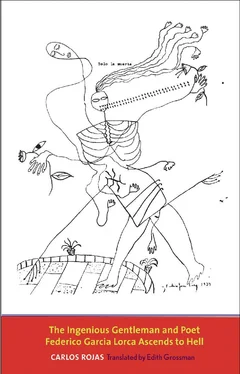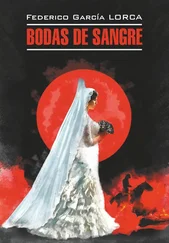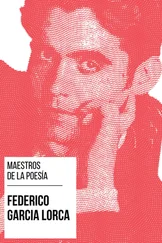“Be quiet! Be quiet! Damn you! I don’t want to endure this martyrdom!”
(WHY DON’T YOU PRETEND YOU’RE CRAZY AND BE ACQUITTED?) No, I can’t pretend to, when I really did lose my mind, and after I was dead. I created this awful hallucination, the image and likeness of my caricature, and now it not only has a life of its own but has come to usurp mine, in another hell that’s a sinister parody of this spiral. What does this implacable old man want of me, the man I would have turned into if I had lived? Is he trying to tell me that my derangement is my only truth and he has become the avatar of my madness? Or perhaps the truth is just the opposite, as he proclaims, and I’m part of the dementia of an old man driven crazy by loneliness? If Ruiz Alonso, Trescastro, and the thugs in the Assault Guard hadn’t arrested me that Sunday morning, perhaps everything he’s telling me is true now and I stayed hidden in that attic of a sort on Calle de Angulo. (“I have orders to take you to the Civilian Government. I’d be grateful if we could make it fast because a lot of time has been lost here.”) Or perhaps, in the most absurd of possibilities, the thugs from the Assault Guard, Trescastro, and Ruiz Alonso never went to Calle de Angulo, 1, and his entire Calvary, with his arrest, interrogations, being shot in the back, and wakefulness in hell were nothing more than the recurrent nightmare of the old man, who he must be as well.
“Be quiet! Be quiet! Damn you! I don’t want to endure this martyrdom!”
He raised his hands to his ears because a rough sea, one of those metallic oceans by Dalí or Patinir, suddenly agitated and disturbed by a storm of blazing volcanoes, seemed stirred up inside him and threatened to blow apart the bones of his skull.
“Be quiet! Be quiet!”
He heard the old man’s words through his hands. But he could distinguish only the dark echo of his own shrieks. An echo that began to irritate and embarrass him, because it wasn’t the broken bellow of the pederast he always knew he was but the screaming of the fairy he never wanted to be. At the same time and in the light of a bright flash of memory, it brought to mind the first time his father guessed at his homosexuality, one infinitely distant summer between his first trip to Madrid and his first stay in Cadaqués, when he dedicated the ode to Salvador Dalí where he said he wasn’t praising his imperfect adolescent brush but his longings of an eternal visionary. It was another Sunday afternoon, because his destiny always seemed to be decided on Sundays, and he was playing from memory something by Chopin on the piano at Huerta de San Vicente. He stopped suddenly when the final ray of late afternoon slipped through the half open window, divided in a prism of the chandelier, and stained his right hand with all the colors in the spectrum. Only then, as he looked at the rainbow on his fingers and perhaps began inadvertently to write a line published years later, where he spoke of a hyacinth light illuminating his hand, did he become aware of his father’s presence, sitting in the semidarkness of a corner in the living room. A mirror reflected his eyes and in his glance he saw the infinite sadness of the first man on earth, different from the monsters that had preceded him, when he discovered loneliness after the death of a child.
“Yes, yesterday afternoon Luis showed up unexpectedly on his return from Madrid,” continued the vampire who was dreaming him or the apparition of his own madness. “He came with the excuse of picking up some recent books he’d lent me. Collections of poems by people your age, or perhaps even younger. Scattered over the floor where I had thrown them, he tripped over the books. ‘If this is the garbage that’s current, that they’re writing today, tell me why a generation of poets like ours ever lived?’ I asked him at the outset. He shook his head, not daring to look me in the eye, and tried to respond with some fallacy about the previous regime, which in its fumbling had castrated the people intellectually. ‘Don’t try to convince me with that kind of specious reasoning. I’m the victim of that regime, locked away in your house for almost half a century, not these kids whose mental capacity doesn’t go beyond impudence and commonplaces. Ours was a generation of exceptional poets and masterpieces. When I say this, I’m not indulging in vanity but summarizing the true history of literature. We were also a group of free men, at least in the best and happiest years. Don’t tell me now about the new pieties, with the people as an object of worship, when we’ve survived so many idiotic catastrophes that we’ve turned into two old wrecks. We’re all people, the two of us, the mason who’s whitewashing that house on Plaza de los Lobos, and even the ones who murdered half of Granada in the name of God. In the universe there’s no effect without a corresponding cause and …’ He interrupted himself suddenly while he was quoting himself almost in shouts, as if he had forgotten ideas and words. ‘… And besides, besides.’ Listen, where was I?”
“You said that in the universe there’s no effect without a corresponding cause,” he replied, not unaware of the irony.
“Exactly, yes, sir, that’s what I said and he couldn’t answer me. ‘The only origin of all our misfortunes, the slaughter of hyenas that our war was, the dictatorship that followed it, and even the foolishness that passes today for poetry, is reduced to this people of yours who have never measured up as an intelligent, civilized community in the eyes of history.’ He found himself obliged to agree, though unwillingly. Then he spoke to me about men your age and others even younger, all of you who could be my sons, though you’re only a splinter of my dream … ”
“I’m not your son and I’m not your dream. I’m a dead man who reasons and has delusions. You’re an apparition in my hallucination.”
He affirmed it now without conviction, as perhaps his father had tried to tell himself that Sunday in Huerta de San Vicente that a pervert could not be a son of his, that he was a ghost who would vanish with the last sun of the afternoon. Besides, the old man, absorbed in the memory of his shouting and diatribes, wasn’t listening to him either.
“He described a generation of supposed poets, dressed in rags in the American style, like hoboes in the films of King Vidor who cross the United States from coast to coast, hiding in a freight car on the Union Pacific. All of them poisoned by the drugs they consume like candied almonds because they’re incapable of thinking and feeling for themselves. ‘Luis,’ I said to him, ‘you talk nonsense and want me to return to this world I have absolutely nothing in common with, though according to you my works are read and performed among those tribes. In the midst of those people I’d live enclosed in an invisible bubble, like an alien. Like those lovers in Bosch, in The Garden of Earthly Delights , imprisoned in a soap bubble or a bladder mislaid at a witches’ Sabbath. If you remembered who we were, you wouldn’t even dare suggest it … And furthermore, furthermore …’ Listen, what else did I say to him?”
“That he shouldn’t advise you to return to The Garden of Earthly Delights. ”
“I already know that, imbecile, and I don’t intend to repeat it!” He was becoming enraged as he caressed his pink baldness. “Ah, yes! Then I thought it was my duty to add: ‘If in addition to remembering who we were you maintained the dignity that should be ours, you’d also turn your back on that jungle and hide away here with me.”’
“And he replied he wasn’t free to do that because his destiny was as irrevocable as yours.”
“That’s true, he said that! How did you know?” he asked without too much interest, shrugging. “Perhaps you’re not as foolish as I thought because, after all, you’re my dream. He replied … ”
Читать дальше












